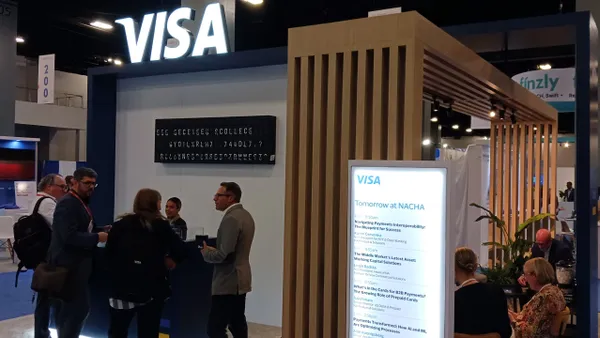Dive Brief:
-
Nationally chartered banks can use stablecoins and blockchains to facilitate payments and other activities, the Office of the Comptroller of the Currency (OCC) said in an interpretive letter published Monday.
-
The bank regulator said, as long as a bank is in compliance with the law and safe and sound banking practices, "a national bank or federal savings association may validate, store, and record payments transactions" by serving as a node on an independent node verification network (INVN).
-
The guidance is the latest in a series of crypto-friendly actions to come from the OCC under Acting Comptroller Brian Brooks, a former Coinbase executive.
Dive Insight:
"While governments in other countries have built real-time payments systems, the United States has relied on our innovation sector to deliver real-time payments technologies," Brooks said in a statement. "Our letter removes any legal uncertainty about the authority of banks to connect to blockchains as validator nodes and thereby transact stablecoin payments on behalf of customers who are increasingly demanding the speed, efficiency, interoperability, and low cost associated with these products."
The OCC's letter clarifies banks can use stablecoins to facilitate payment transactions for customers on an INVN, including by issuing a stablecoin and by exchanging that stablecoin for fiat currency.
"In this context, stablecoins function as a mechanism of payment, in the same way that debit cards, checks, and electronically stored value (ESV) systems convey payment instructions. Banks have long used cashiers' checks, travelers' checks, and other bearer instruments as a means of facilitating cashless payments," the OCC wrote.
Lobbying group the Blockchain Association called the OCC's move "a giant advance for crypto," as it paves the way for blockchains and other distributed ledger technologies to be a formal part of the U.S. financial infrastructure.
"The letter states that blockchains have the same status as other global financial networks, such as SWIFT, ACH, and FedWire," the group wrote in a tweet Monday.
Nic Carter, partner of Castle Island Ventures, told Forbes the OCC's guidance allows banks "to take advantage of the always-on features of public blockchains."
"I don't see stablecoins imminently replacing traditional financial rails, but this is a vital first step in normalizing the notion of public blockchains as an alternative settlement infrastructure that banks can freely adopt," he said.
The OCC's recent guidance on stablecoins and blockchains follows another interpretive letter it issued in July, which clarifies national banks are allowed to provide cryptocurrency custody services, and hold unique cryptographic "keys" associated with cryptocurrency on behalf of customers.
JPMorgan Chase last spring extended banking services to crypto firms Coinbase and Gemini — a step that served as "a major signal of credibility to the [crypto] industry," Robert Norris, a managing principal at consultancy firm Capco, told Banking Dive last year.
However, the regulatory gains cryptocurrency has made under Brooks' leadership at the OCC could be under threat.
House Financial Services Committee Chairwoman Maxine Waters, D-CA, sent a letter last month to President-elect Joe Biden, calling on the former vice president to rescind or monitor all of the crypto-related guidance issued by the OCC.
The cryptocurrency industry has also rallied against a recent proposed rule released by the Treasury Department's Financial Crimes Enforcement Network (FinCEN), which would require banks and money services businesses to submit reports, keep records and verify the identity of customers in relation to transactions involving "unhosted" digital asset wallets — wallets not held by a financial institution.
The proposed rule would require banks to file a report to FinCEN for unhosted wallet transactions exceeding $10,000 in value.
Square CEO Jack Dorsey said the rule "creates unnecessary friction and perverse incentives for cryptocurrency customers to avoid regulated entities."
"By adding hurdles that push more transactions away from regulated entities like Square into non-custodial wallets and foreign jurisdictions, FinCEN will actually have less visibility into the universe of cryptocurrency transactions than it has today," he wrote in a letter to the agency Monday.
Coinbase and cryptocurrency exchange Kraken, which obtained a special-purpose depository institution license from Wyoming in September, have also objected to the FinCEN proposal.












